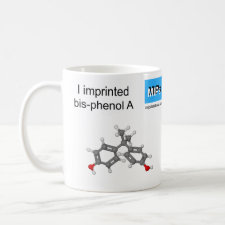
Authors: Mei SR, Wu D, Jiang M, Lu B, Lim JM, Zhou YK, Lee YI
Article Title: Determination of trace bisphenol A in complex samples using selective molecularly imprinted solid-phase extraction coupled with capillary electrophoresis.
Publication date: 2011
Journal: Microchemical Journal
Volume: 98
Issue: (1)
Page numbers: 150-155.
DOI: 10.1016/j.microc.2011.01.003
Alternative URL: http://www.sciencedirect.com/science/article/B6W6H-51XY0F8-4/2/d8d5b7ea7aef385e049e9cec137d1a58
Abstract: The highly selective, fast and effective sample pretreatment technique molecularly imprinted solid-phase extraction (MISPE) can overcome the low sensitivity of the highly efficient capillary electrophoresis-UV method (CE-UV). In this work, narrowly dispersible bisphenol A (BPA)-imprinted polymeric microspheres with a high capacity factor of k' = 6.8 and an imprinted factor of I = 6.53 were investigated as selective solid-phase extraction (SPE) sorbents for use in extraction of BPA from different sample matrices (tap water, wastewater, Yangtze River water, soil from the Yangtze River, shrimp and human urine). Washing and eluting protocols of MISPE were optimized. Under optimal conditions, recoveries of MISPE were investigated. Recoveries were basically constant and the relative standard deviation (RSD) was lower than 5.8% when loading volumes changed from 1 to 50 mL. Recoveries ranged from 71.20% to 86.23% for different sample matrices. Compared with C18 SPE, MISPE had higher selectivity and recovery for BPA. BPA was determined with good accuracy and precision in different complex samples using CE-UV coupled with MISPE. Spiked recoveries ranged from 95.20% to 105.40%, and the RSD was less than 7.2%. Because a large loading volume was achieved, the enrichment efficiency of pretreatment and the sensitivity of this method were improved. The limits of detection of this MISPE-CE-UV method for BPA in tap water, wastewater, Yangtze River water, soil from the Yangtze River, shrimp and human urine were 3.0 μg L-1, 5.4 μg L-1, 6.9 μg L-1, 2.1 μg L-1, 1.8 μg L-1 and 84 μg L-1, respectively
Template and target information: bisphenol A, BPA
Author keywords: Molecularly imprinted polymers, capillary electrophoresis, bisphenol A, molecularly imprinted solid-phase extraction



Join the Society for Molecular Imprinting

New items RSS feed
Sign-up for e-mail updates:
Choose between receiving an occasional newsletter or more frequent e-mail alerts.
Click here to go to the sign-up page.
Is your name elemental or peptidic? Enter your name and find out by clicking either of the buttons below!
Other products you may like:
 MIPdatabase
MIPdatabase









